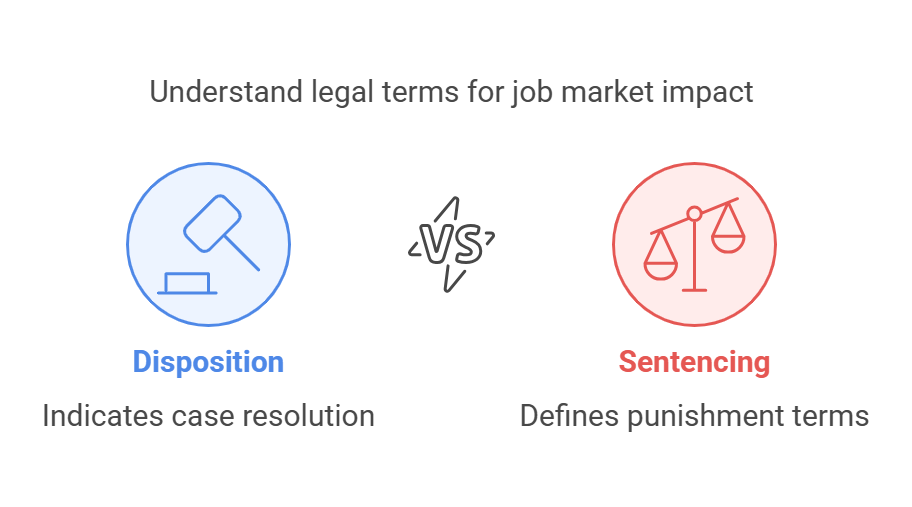When navigating the legal landscape, particularly in the context of employment background checks, understanding the nuances between legal terminologies like "disposition" and "sentencing" can be vital. These terms, while related, carry distinct implications both legally and in the context of background checks, which can significantly impact a job seekerâÂÂs career prospects.
In this article, we will explore the critical differences between disposition and sentencing, and how these play into employment background checks. We'll offer guidance for both employers and job seekers, ensuring you gain a comprehensive grasp on how these factors can affect the hiring process.
Key Takeaways
- Disposition in a legal case indicates its resolution, such as dismissal, conviction, or acquittal, and is crucial for job seekers to understand for employment discussions.
- Sentencing occurs after a conviction and determines the punishment, providing an insight into the seriousness of an offense.
- Disposition reflects the outcome of a case, while sentencing outlines the consequences, both essential for background checks.
- Background checks assess disposition and sentencing to estimate the risk posed by hiring candidates with legal issues.
- Job seekers should be transparent about their legal history during interviews, as honesty can foster trust with employers.
What is Disposition?
In the legal world, "disposition" refers to how a criminal charge is resolved. It marks the case's outcome, whether decided by a judge or a jury. Possible outcomes for disposition include:
- Dismissal: Charges are dropped without a conviction.
- Conviction: The person is found guilty.
- Acquittal: The person is found not guilty.
Disposition is a crucial piece in employment background checks, as it tells the final resolution of a case. For job seekers, understanding your case disposition can help frame discussions about past legal matters with future employers. Knowing whether your case ended in acquittal, dismissal, or conviction prepares you to answer any questions openly and truthfully. Employers see dispositions as part of the holistic pictureâÂÂnot the whole story but a significant part of it.
Authenticity, honesty, and transparency are paramount in any relationship, including the employee-employer relationship. Just like personal relationships, it's best to start with a clean slate. While there may be implications, it's crucial to be part of a company that embraces your whole self, including during challenging times. For HR and business leaders, asking the right questions and being intentional about the hiring process are essential steps to zeroing in on the best candidate for your work environment.
What is Sentencing?
Sentencing comes into play after a conviction, setting the punishment for the crime. It outlines the consequences an individual will face and can include various forms of penalties. The possible outcomes involve:
- Fines: Financial penalties that the convicted person must pay.
- Probation: Instead of serving time, the individual follows a set of conditions for a specified period.
- Incarceration: This involves serving time in jail or prison.
Sentencing details can shed light on the gravity of the offense and the judicial response to it. When background checks are conducted, this information gives employers a clearer picture of the applicant's criminal history. It enables them to evaluate the seriousness of past offenses and their potential impact on the workplace. Understanding sentencing intricacies assists employers in assessing the implications of hiring someone with a past conviction, while job seekers can better prepare to address any questions about their history.
Disposition vs. Sentence: Key Differences
In the legal process, disposition and sentencing each have distinct roles. Disposition refers to the end result of a case, indicating what ultimately happenedâÂÂwhether the charges were dropped, the accused was found guilty, or the person was acquitted. It's the moment when a legal saga closes its chapter.
On the other hand, sentencing kicks in post-conviction. It sets the terms and conditions under which the convicted individual will serve their punishment, whether through fines, probation, or imprisonment. Essentially, while disposition answers "what happened," sentencing answers "what now."
In the realm of background checks, the distinction holds weight. Disposition tells employers the resolution of a case, offering a snapshot of one's legal standing. Sentencing informs them about the aftermathâÂÂhow the individual was held accountable and what penalty, if any, was imposed.
Grasping these differences is crucial for anyone navigating the job market and those evaluating candidates. A clear understanding helps determine how past legal matters align with job requirements, especially in sectors where trust and reliability are paramount.

How Do Background Checks Use Disposition and Sentencing Information?
Background checks are tools for employers to make informed hiring choices. Understanding disposition and sentencing is a crucial part of this process for a few reasons.
- Evaluating Risk: Employers analyze disposition and sentencing information to gauge the risk associated with a candidate. A case that ended in dismissal poses minimal risk, while a recent conviction might require more consideration. Employers want to ensure a safe and reliable workforce, so they weigh how past legal issues might affect workplace dynamics.
- Role Suitability: For certain positions, background checks need to be stringent. Jobs in finance, for example, often have zero tolerance for past fraud convictions, given the trust and responsibility the job demands. Similarly, workplaces involving vulnerable populations need employees with clean records to ensure safety and trust.
Understanding this information helps employers shape hiring policies that are fair but careful. It's about balancing the need for a secure working environment with the opportunity for individuals to move forward from past mistakes. With comprehensive insights, employers can mitigate risks, aligning their workforce with the companyâÂÂs values and safety standards.
Addressing Job Seeker Concerns About Background Checks
Navigating the murky waters of past legal issues can be a nerve-wracking experience for job seekers. ItâÂÂs common to worry about how prior charges or convictions might affect job prospects. Addressing these concerns head-on is crucial. Here are a couple of questions frequently posed by applicants, along with some straightforward advice:
- "Will a Dismissed Charge Still Appear?" Yes, a dismissed charge typically surfaces on background checks. However, its impact is generally minor, especially if addressed with honesty during interviews. Many employers view a dismissed charge as a closed chapterâÂÂnot something that should hinder your character assessment.
- "Should I Disclose a Conviction?" Always come clean. Honesty is indispensable, especially since many companies now practice fair chance hiring, offering individuals with past convictions the opportunity to start anew. Transparency about your past not only builds trust but also aligns with the values of organizations looking for integrity.
For a deeper dive into what employers consider red flags, you can visit blogs or resources focused on background check red flags. They provide valuable insights for job seekers about handling past convictions with care. Remember, being prepared for these conversations can ease anxieties and help you focus on showcasing your strengths.
Utilizing Services for Background Checks
Employers often turn to specialized services for conducting background checks as a means to streamline their hiring process. These services are designed to gather all pertinent information about a candidate's dispositions and sentencing, ensuring that the hiring team has a clear picture of the applicantâÂÂs legal history. By using these services, companies aim to reduce manual error, save time, and maintain compliance with legal standards, particularly concerning privacy and discrimination laws.
For job seekers, engaging with self-background check services can be equally beneficial. By accessing this information in advance, applicants can better prepare to address any red flags or discrepancies that potential employers might notice. This proactive approach allows candidates to formulate explanations and demonstrate their transparency, potentially easing concerns during interviews.
Overall, whether you're an employer or a job seeker, utilizing background check services can provide clarity and mitigate uncertainties in the hiring process.
Conclusion
Grasping the distinction between disposition and sentencing plays a crucial role in employment scenarios. For employers, it's about making informed choices that balance opportunity and risk. Knowing whether a case was dismissed or led to a conviction, and understanding the specific sentencing, guides the hiring process.
Job seekers, on the other hand, benefit from understanding these terms to better articulate their legal past. Disposition and sentencing details can be sensitive, yet clarity and honesty in explaining them can foster trust with potential employers.
Both sides should leverage resources and tools to ensure transparency in the hiring process. With informed decisions and open communication, the path to fair employment becomes clearer for everyone involved.
Frequently Asked Questions
What does it mean when someone has a disposition?
In legal terms, when someone has a disposition, it refers to the final outcome or resolution of a criminal case, such as dismissal, acquittal, conviction, or other judicial rulings.
What is the difference between a disposition and a deposition?
In legal terms, a disposition refers to the final outcome or resolution of a criminal case, such as dismissal, acquittal, or conviction. On the other hand, a deposition is a sworn, out-of-court testimony given by a witness as part of the discovery process in a legal proceeding. It is typically recorded and can be used as evidence during the trial. In short, a disposition is the case outcome, while a deposition is a witness's testimony.
Is disposition a good or bad thing?
In legal terms, a disposition isn't inherently good or bad. It simply refers to the final outcome or resolution of a case, whether it's dismissal, acquittal, or conviction. The nature of the disposition depends on the specifics of the case and the judgment rendered.
Glossary of Terms
- Disposition: Disposition refers to the final resolution or outcome of a legal case. It indicates whether charges were dropped (dismissal), the accused was found guilty (conviction), or the accused was found not guilty (acquittal). In employment contexts, disposition helps employers understand the resolution of a candidate's legal history and assess how it might relate to workplace responsibilities.
- Sentencing: Sentencing is the phase that follows a conviction, determining the punishment or penalty assigned to an individual. Outcomes can include fines, probation, or incarceration, depending on the severity of the offense. Employers often review sentencing information during background checks to better understand the gravity of past convictions and their relevance to workplace safety and reliability.
- Background Checks: Background checks are investigative processes used by employers to verify candidates' history, including criminal records, education, and work experience. Information about disposition and sentencing is a key part of these checks, giving hiring teams the details needed to evaluate potential risks and role compatibility. Job seekers can also use these checks to anticipate questions and prepare transparent explanations during the hiring process.
Additional Resources
- What is Adjudication in Background Checks?
- California Expungement: Your Complete Guide to a Clean Slate
- Do Pending Charges Show Up on a Background Check?
- What Does Disposition Mean on a Background Check? A Simple Guide
- What Does Disposition Mean on a Background Check? A Clear Explanation

GCheck Editorial Team
Meet the GCheck Editorial Team, your trusted source for insightful and up-to-date information in the world of employment background checks. Committed to delivering the latest trends, best practices, and industry insights, our team is dedicated to keeping you informed.
With a passion for ensuring accuracy, compliance, and efficiency in background screening, we are your go-to experts in the field. Stay tuned for our comprehensive articles, guides, and analysis, designed to empower businesses and individuals with the knowledge they need to make informed decisions.
At GCheck, we're here to guide you through the complexities of background checks, every step of the way.






